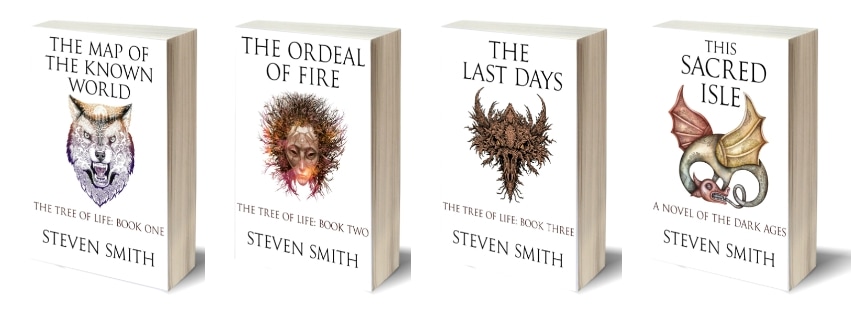|
In my last blog post I mentioned the amount of online help available to authors and indie publishers. Over time I’ve grown to appreciate the importance of such websites and they have been a source of advice and inspiration. When I wrote my first novel, The Map of the Known World, it felt a somewhat lonely venture – now with a wide, varied online writing community it is much easier to find advice and get connected to other authors. I’d like to outline five of the best websites out there for writers: The Creative Penn
This site is run by thriller author JF Penn and is a mine of information and inspiration. The blog is regularly updated with new, relevant articles, keeping readers up-to-date with the latest (and future) trends in the world of indie publishing. There are also extensive archives of articles on all facets of writing and publishing – whatever stage you have reached on your writing journey, The Creative Penn can help you! Ellen Brock I’ve only recently discovered this site, which is run by professional editor Ellen Brock. The site has a wide range of articles and advice on the technical skills of writing – in addition Ellen has a host of videos (which can either be viewed via the website or on YouTube) on writing, publishing and editing, all of which are well worth watching. If you have a query on any aspect of the craft of writing, you are highly likely to find the answer on this website! Self-publishing formula This is the website of best-selling author and self-publishing guru Mark Dawson, and it is chocked full of content, with an excellent range of podcasts that are both fun and highly informative. Alliance of independent authors You could spend many, many hours going through the content on this site and it would be time very well spent! There are articles on every aspect of self-publishing you could possibly imagine (from writing, editing, production, marketing and many more). The site also has a regularly updated blog, jam-packed with useful information and inspiring stories from other authors. As with The Creative Penn, I find this site a good way of keeping up-to-date with trends in the writing and publishing world. Jane Friedman Publishing expert Jane Friedman’s blog covers both traditional and self-publishing topics, including interviews with successful authors and industry figures. Highly professional, thought-provoking articles are the norm here. I would also like to mention a couple of online communities I use. The first is SFF Chronicles – this is aimed primarily at fans of SF and Fantasy, and if you write in either of those genres, then joining this forum is an absolute must. This is a really fun, supportive and helpful community – highly recommended. The second is KBoards, which is a good way of connecting with fellow authors publishing via KDP (it is not limited to authors on the KDP Select programme). This is really only the tip of a very large iceberg, but all these sites, in my humble opinion, give thoughtful, trustworthy advice and can help to inspire and improve your writing skills. The fact that there is so much advice and support (and much of it free) out there means there really hasn't been a better time to be an author. More and more authors are sharing their content, their experiences and discoveries, and passing these onto others. I could never hope to offer advice that matches the quality and depth given by the websites I've mentioned, but I have tried to share my writing experiences - for example, after writing This Sacred Isle, I posted a series of articles looking at different aspects of the journey of creating that book (if you're interested, the first post is here). I really wanted to tap into the supportive and collaborative attitude I have often discovered online, an attitude which can make the lonely job of writing just a little less lonely! Which websites do you use for writing advice? Add a comment and join the conversation.
1 Comment
In this post I am going to talk a little about the early stages of my writing journey, and pass on five key tips to help anyone starting to write their first book. I always wanted to write, always wanted to tell stories. However, when, in my very early twenties, I started to devote some serious time and effort to writing, I could not have imagined how long the process would take. My first effort was a thriller novel set in a future Britain that has become part of a United European State (hmm, I didn’t foresee Brexit) – despite a promising start I soon realised my efforts fell far short of my original vision, and certainly were nowhere near professional standard. I threw in the towel after about five chapters. I thought about giving up completely; finishing a book, properly finishing it, seemed an impossible task. But despite this chastening experience, I had caught the writing bug. I wanted to keep trying, so I switched my efforts to a SF novel called Colony. Learning some key lessons from my abandoned first effort (and from reading a number of books on the craft of writing) I made better progress and actually completed a first draft. But on a read-through I realised the story was deeply, irrevocably flawed and my writing was still substandard. I decided not to proceed any further and so Colony became another abandoned project. However, I had at least proved to myself that I had the stamina to create a full draft of a novel. After two attempts at writing a novel, I focused for a couple of years on writing short stories. The quality was variable, ranging from frankly appalling to passable – a couple of my stories were even published in an indie SF magazine, and I also had some encouraging rejections from prominent genre publications. These early efforts were clumsy (and some of the stories were terrible) – I hated my stodgy, cliché-infected prose and lifeless dialogue. But as I continued to write, something weird happened: I created the odd decent line, not great literature but serviceable prose. Slowly such lines became more frequent. I wrote decent paragraphs, decent sections and decent chapters. Slowly, I was getting better. The two novels had failed, as had most of the short stories, but I had written hundreds of thousands of words in the process, strengthening my authorial muscles. And after years of effort, of often painful practising, of learning, I felt ready to attempt a novel again, and this time I was determined to complete it. I had a plan (I had a trilogy sketched out), so launched into The Map of the Known World. It took years to craft this book and the subsequent instalments in the series, but I applied the valuable lessons I’d already learned, and learned many new ones! And since completing the Tree of Life trilogy, I have written another novel (This Sacred Isle) and am now working on a new story (a SF novel called Second Sun). What tips would I give someone in the very early stages of their writing journey? Here are five things I believe are essential, five things I wish I had known when I first put pen to paper: IT TAKES TIME You will be disappointed by your early writing efforts but try not to be discouraged. Don’t be too hard on yourself and don’t give up - instead allow yourself the time and space to improve. Keep learning about the craft – there are many good books that can help you (please see my blog post on this subject). Think about the novels / short stories you read, what you like or dislike about them. And embrace your early failures – they can be frustrating of course, but they give you valuable lessons. Like most writers, I have my incomplete novels, abandoned stories, but I view them now as experiments, not as worthless failures. Developing your writing skills can be a slow process, but if you keep working, if you keep learning, you’ll improve. HELPING HANDS Writing can feel lonely, very lonely, but don’t despair, there’s lots of help out there – you’re not alone! This is especially true in our digital world. When I started writing, the internet was in its infancy (remember dial-up?) but now there are many websites giving support and sound advice (among the best I would point you to The Creative Penn, Self Publishing Formula and the website of editor Ellen Brock). In addition, there are some fantastic online communities (LinkedIn groups can be valuable, and I also enjoy being part of SFF Chronicles) where you can connect with other authors / creators and share knowledge. If you encounter a problem with your writing, don’t suffer in silence - reach out and I guarantee you’ll find help. And if you can get constructive criticism of your work (many forums allow you to post samples of your work for a critique), even better - some early honest feedback can keep you on track and keep you motivated. KICK PERFECTION INTO TOUCH You’ve probably already realised this, but in case you haven’t, I’ll say it out loud: perfection is not possible. Yes, by all reasonable means strive to make your writing as good as possible – a professional editor is a must – and demand high standards of yourself, but never EVER expect perfection. You have to learn to let go, otherwise you’ll never finish, you’ll never move on. Get your work out there, whether you send it to an agent / publishing house or indie publish it doesn’t matter – share your work with the world. This can be a difficult obstacle to overcome (I certainly have perfectionist tendencies) but a necessary one if you want to get your work out there. It is your determination that is the key to success, not an obsession with perfection. WRITE OFTEN We all have a myriad of pressures on our time, but it is important, no essential, to write regularly, to develop a writing habit. It doesn’t matter if it’s only twenty / thirty minutes a day – keep to a consistent, regular pattern and you’ll be surprised how much work you can accomplish. Of course, there’ll be times when you feel tired or demotivated but if you can manage to write at those moments then you’ll really be making progress. Some of my best writing and strongest ideas have come when I was writing despite not at all being in the mood! WEB PRESENCE This last tip moves beyond the actual craft of writing but it is still important if you want your work to reach any kind of audience: you must have a web presence. Get your content out there, blog and tweet – try to make meaningful connections. Don’t wait to finish your novel or collection of short stories / poems first – post about your progress, try to find people with similar interests, other authors, or readers who like the kind of book you are writing. I failed to do this early on and it was a big mistake I made. I hesitated, dithered, took too long before having a website and venturing onto social media, and it is tricky to play catch-up!
It can be daunting to put yourself forward like this. Trust me, I know! I’m not a natural self-promoter (far, far from it, to be honest) but I’ve come to realise it is not promotion, it is not marketing, it is connecting, which is much more valuable and interesting. I hope these tips are helpful for you as you start your writing journey. If you have further tips or observations you'd like to add, please leave a comment below. If you're interested in reading some of my work, you can download the ebook version of my first novel, The Map of the Known World, for FREE from all major ebook retailers. |
Archives
October 2023
Categories
All
|






 RSS Feed
RSS Feed